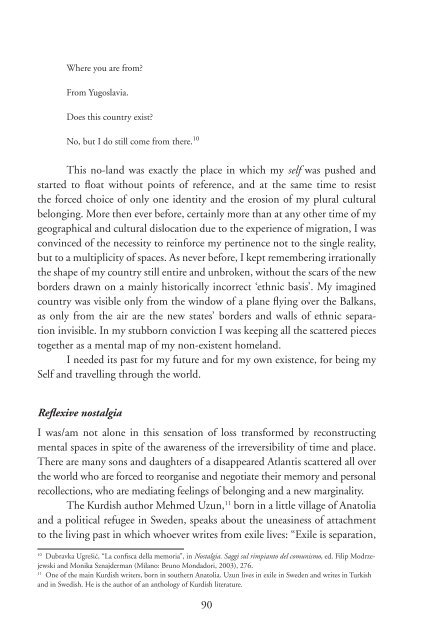Teaching Subjectivity. Travelling Selves for Feminist ... - MailChimp
Teaching Subjectivity. Travelling Selves for Feminist ... - MailChimp
Teaching Subjectivity. Travelling Selves for Feminist ... - MailChimp
You also want an ePaper? Increase the reach of your titles
YUMPU automatically turns print PDFs into web optimized ePapers that Google loves.
Where you are from?<br />
From Yugoslavia.<br />
Does this country exist?<br />
No, but I do still come from there. 10<br />
This no-land was exactly the place in which my self was pushed and<br />
started to float without points of reference, and at the same time to resist<br />
the <strong>for</strong>ced choice of only one identity and the erosion of my plural cultural<br />
belonging. More then ever be<strong>for</strong>e, certainly more than at any other time of my<br />
geographical and cultural dislocation due to the experience of migration, I was<br />
convinced of the necessity to rein<strong>for</strong>ce my pertinence not to the single reality,<br />
but to a multiplicity of spaces. As never be<strong>for</strong>e, I kept remembering irrationally<br />
the shape of my country still entire and unbroken, without the scars of the new<br />
borders drawn on a mainly historically incorrect ‘ethnic basis’. My imagined<br />
country was visible only from the window of a plane flying over the Balkans,<br />
as only from the air are the new states’ borders and walls of ethnic separation<br />
invisible. In my stubborn conviction I was keeping all the scattered pieces<br />
together as a mental map of my non-existent homeland.<br />
I needed its past <strong>for</strong> my future and <strong>for</strong> my own existence, <strong>for</strong> being my<br />
Self and travelling through the world.<br />
Reflexive nostalgia<br />
I was/am not alone in this sensation of loss trans<strong>for</strong>med by reconstructing<br />
mental spaces in spite of the awareness of the irreversibility of time and place.<br />
There are many sons and daughters of a disappeared Atlantis scattered all over<br />
the world who are <strong>for</strong>ced to reorganise and negotiate their memory and personal<br />
recollections, who are mediating feelings of belonging and a new marginality.<br />
The Kurdish author Mehmed Uzun, 11 born in a little village of Anatolia<br />
and a political refugee in Sweden, speaks about the uneasiness of attachment<br />
to the living past in which whoever writes from exile lives: “Exile is separation,<br />
10<br />
Dubravka Ugrešić, “La confisca della memoria”, in Nostalgia. Saggi sul rimpianto del comunismo, ed. Filip Modrzejewski<br />
and Monika Sznajderman (Milano: Bruno Mondadori, 2003), 276.<br />
11<br />
One of the main Kurdish writers, born in southern Anatolia. Uzun lives in exile in Sweden and writes in Turkish<br />
and in Swedish. He is the author of an anthology of Kurdish literature.<br />
90

















